The New Stack statistics on Kubernetes implementation difficulties
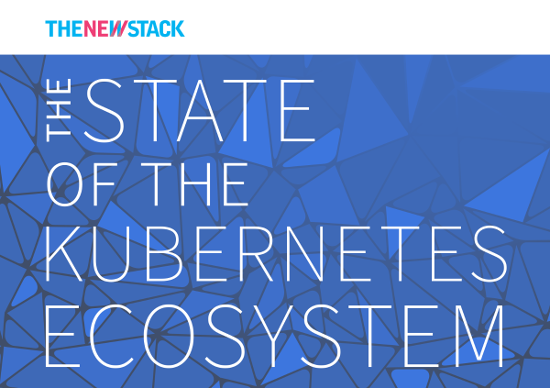
In May 2017, the online edition of The New Stack conducted a survey of 470 representatives of organizations that described themselves as container users. The data collected was published in a special e-book on Kubernetes, and the key findings are published as separate news on the resource. The last of them was devoted to the implementation of Kubernetes, and that's what the figures say ...
Obstacles to implementation
It is unlikely that anyone will be surprised by the fact that the main obstacle to slowing down the application of Kubernetes is the complexity of the configuration and support of the product - 36% of those surveyed (who do not use K8s in production) unequivocally agree, and 39% agree to one degree or another , which in total gives 75% .
However, one cannot fail to note the closest pursuer among the answers to this question - the presence of other projects with a high priority - which in total was supported by 60%. Apparently, the need for these respondents to implement K8s is still not so high due to the specific infrastructure or lack of confidence about the applicability, available capabilities and / or the proven reliability of Kubernetes.
Of the other results about what else is hindering Kubernetes adaptation, almost half of the respondents (43%) use different solutions to one degree or another, and 27% think that manual orchestration is more or less enough. However, both of these arguments are no longer very significant for the vast majority of respondents.
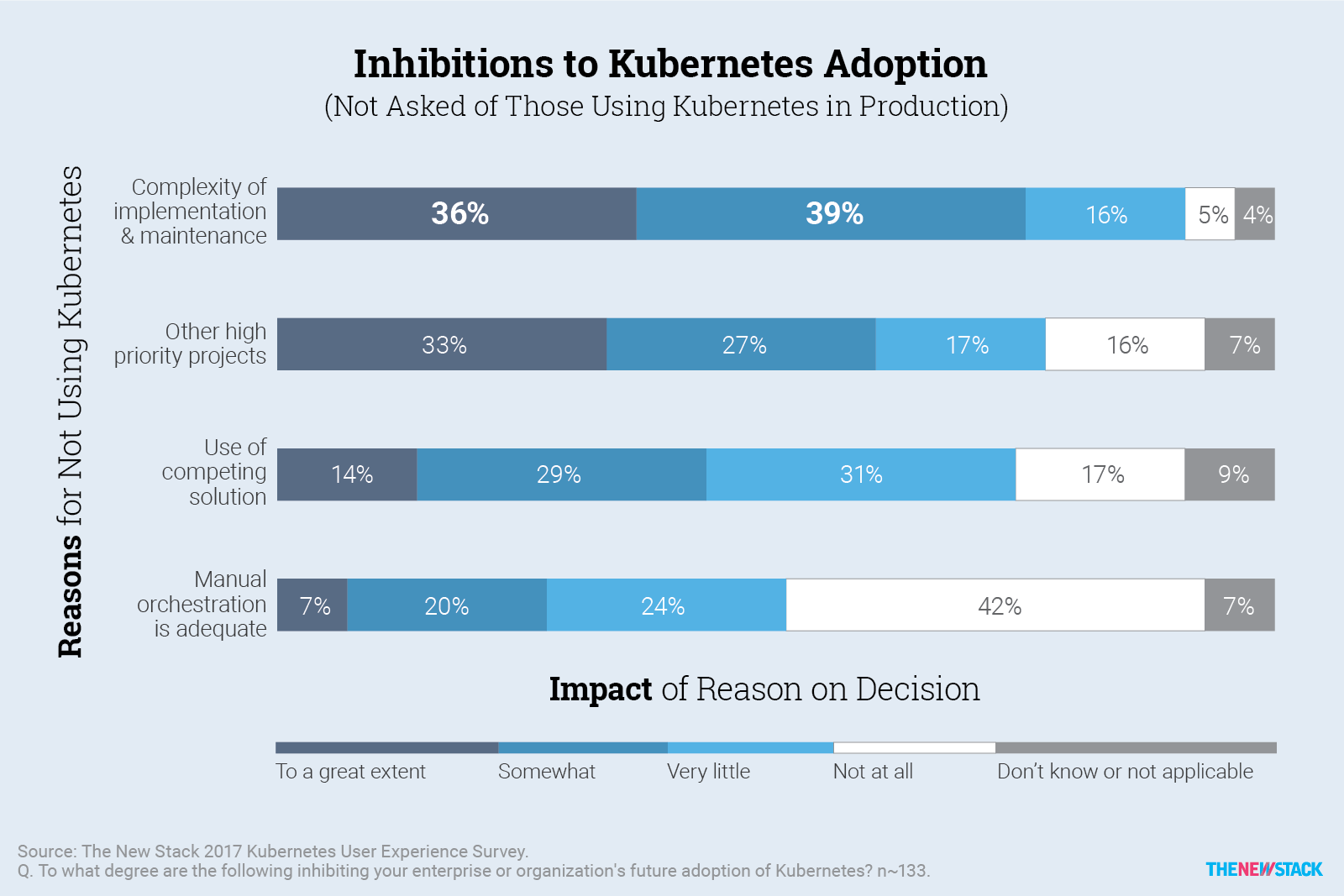
Implementation Dates
The time spent on implementing Kubernetes met expectations (or was even less) in 56% of cases , but more than a third of respondents (38%) dragged on this process.
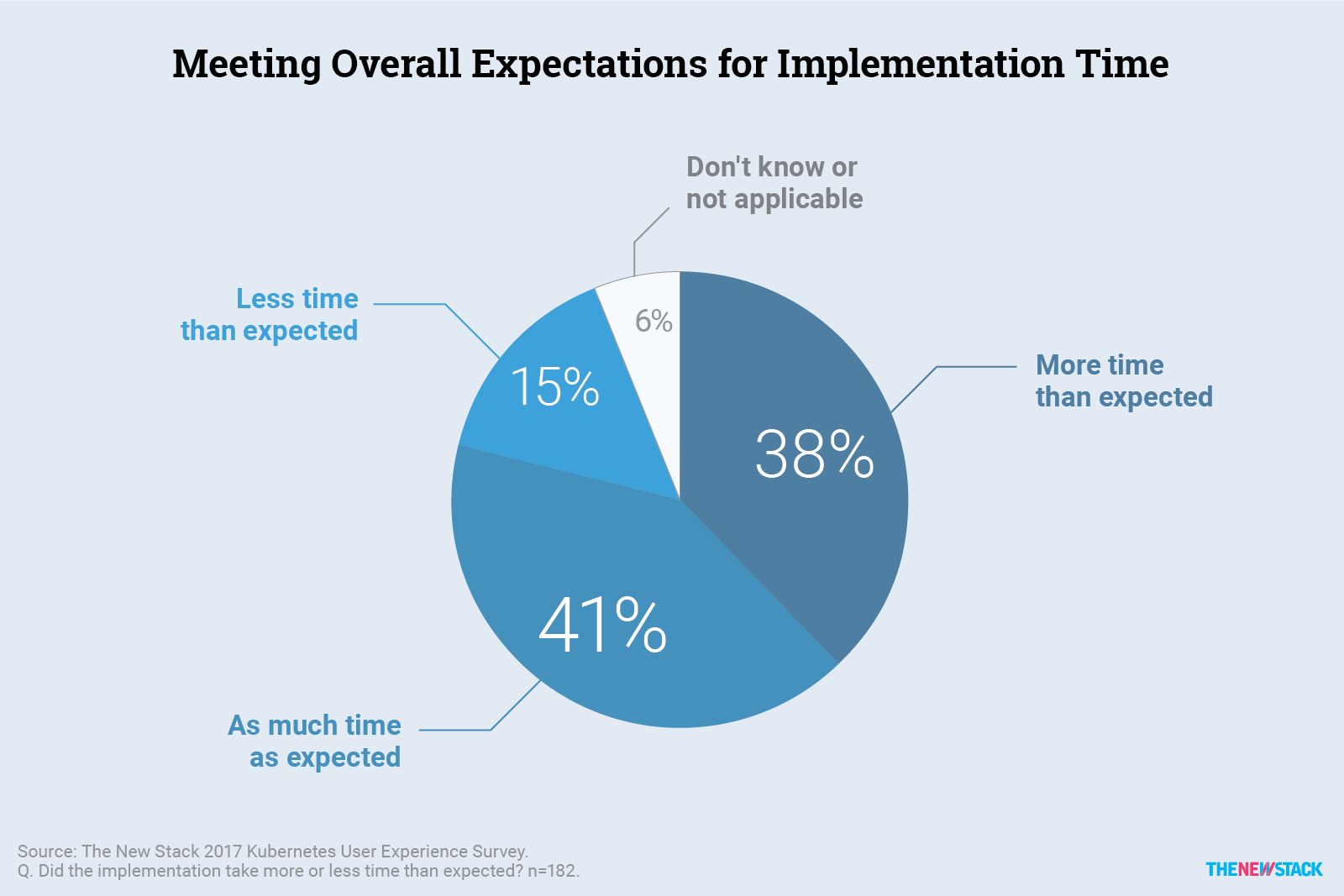
The initial phase of implementation is the most time-consuming: only 50% of users surveyed at this stage completed the time forecast. At the same time, full implementation was within the deadlines for 63% of respondents.
One small business representative noted that the implementation took longer due to poor Kubernetes documentation a year ago, but “today is much simpler.” I heard similar criticism of the project from other companies that introduced Kubernetes a year or two ago - for example, Concur(later absorbed by SAP). According to the results of their project on introducing K8s into production in 2016, Concur experts called insufficient / detailed documentation the main problem of the young Open Source project. And by 2017, they fell in love with CoreOS products, explaining their choice with “the best documentation for Kubernetes”.
78% of the respondents engaged in the implementation themselves, 12% assigned this task to another team within the company, and 9% to third-party specialists involved in Kubernetes and DevOps. For cases of Kubernetes implementation with the help of contractors, 20% of respondents did not meet the deadlines, which is almost twice as good as the general indicator, when the implementation was mainly carried out on their own.
Implementation Results and Conclusions
According to data from 173 Kubernetes users in production, this system fully or partially meets their needs in 99% of cases . At the same time, users of large-scale Kubernetes implementations are more than completely satisfied with the system - they have this indicator one third higher than those who are at the initial stage of operation.
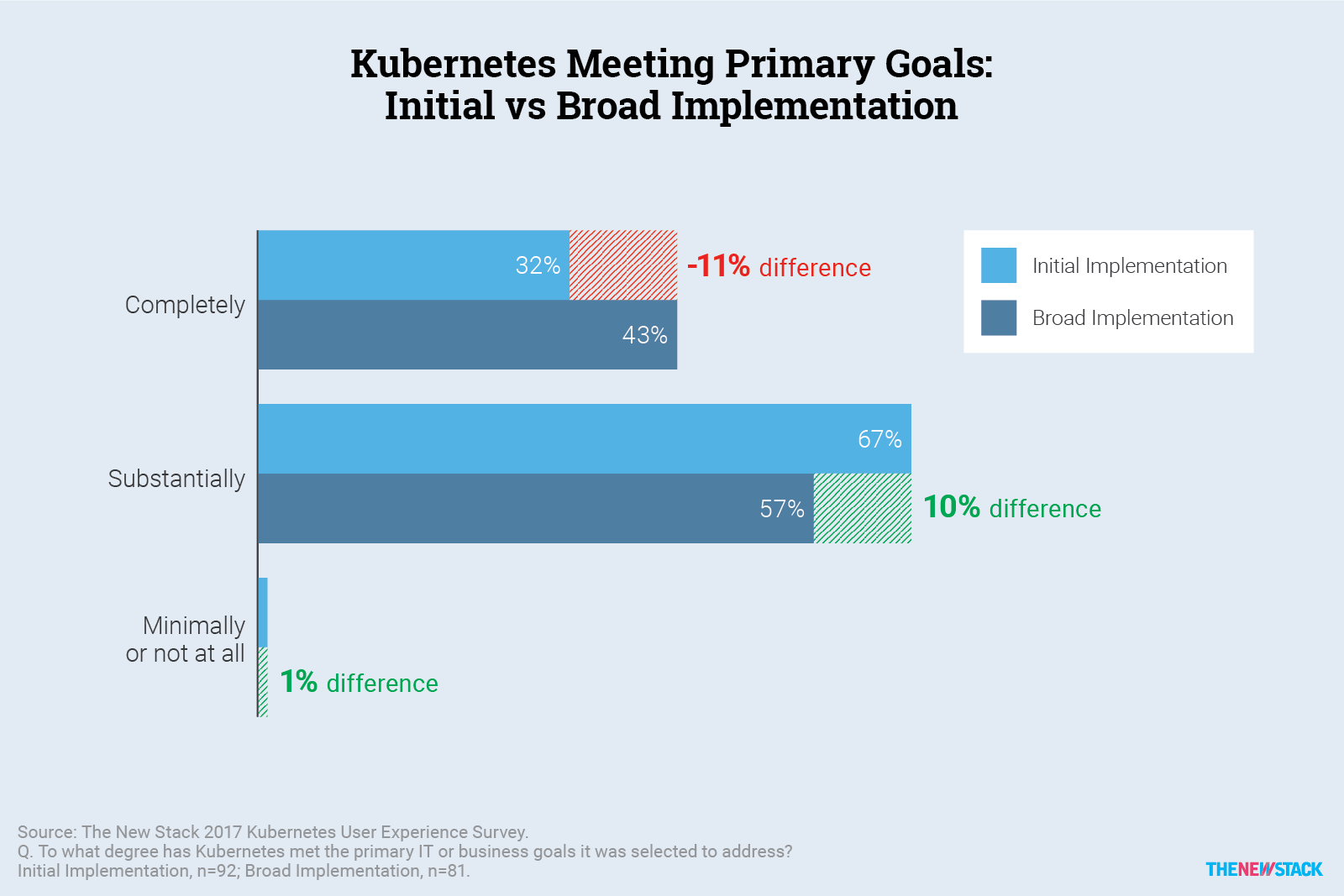
As noted in The New Stack, “even though slightly less than half of the users who have extensively implemented Kubernetes are completely satisfied with the result, remember that at their 2-year-old Kubernetes ecosystem (or market) is still a whole year before some analytic firms can consider its as a developed, established market. ”
Another conclusion isat the implementation stage, Kubernetes requires significant human resources, but over time they pay off (due to the fact that deployment is accelerated, infrastructure management, scaling, etc. are simplified).
What conclusions are made regarding the market? With a high probability, many companies will look for orchestration solutions integrated into larger platforms that are already being used by them in some way (which have gained sufficient expertise, experience, and confidence). In addition, the complexity and length of implementation of Kubernetes means good opportunities for new companies that can solve these problems for customers (using their products and services).
Other information about the respondents
You can get a better idea of the users polled in The New Stack by additional statistics published in the mentioned e-book :
- 62% use Kubernetes in production (fully or initially), 22% evaluate or try K8s;
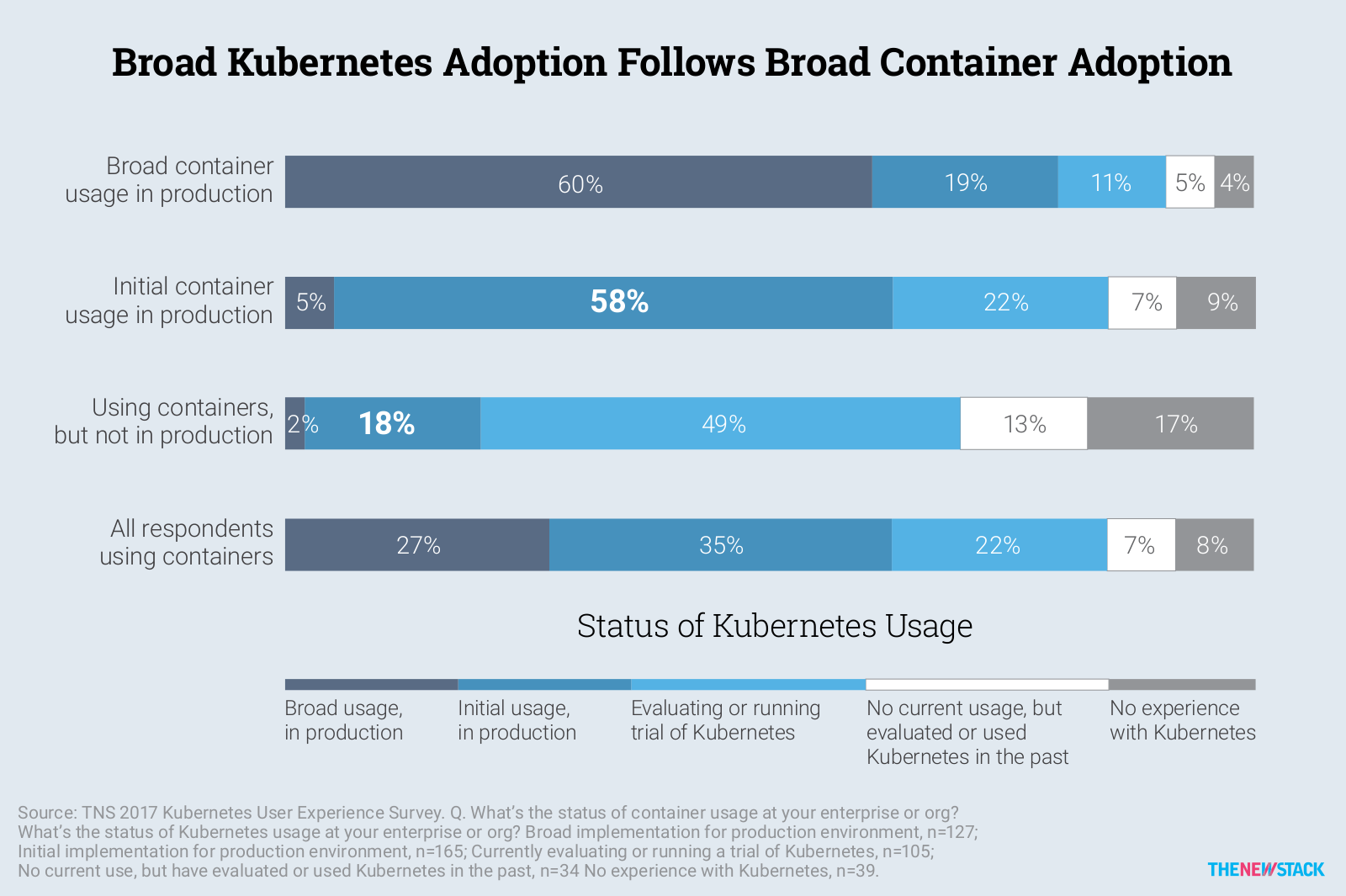
- Kubernetes is most widely used by large organizations: in production (at the initial stage or everywhere) 72% of companies with more than 1000 employees use it (for comparison, companies with 2-100 and 101-1000 employees have 57% and 54 % respectively) ;
- Kubernetes most popular workloads are the application development cycle, which includes CI / CD, testing, etc. (65%), as well as web services and ecommerce (53%), specialized industrial applications (37%); for mobile applications and services - 30%, for business applications (ERP, CRM ...) - 24%;

- the number of deployed clusters among users who actively use Kubernetes in production - 2 (22%), 6-10 (20%), 3 (16%); one cluster in 8% of respondents, and more than 50 clusters in 5%;
- the community edition of Kubernetes is used by 74% of respondents , and various options from vendors - 45% (some use different K8s distributions at the same time);
- among other solutions for orchestration tasks, at least partially used by respondents, are Docker Engine / Swarm (29%), proprietary utilities and scripts (16%), Amazon ECS (12%), Apache Mesos / Mesosphere and OpenStack Magnum (9% each) );
- the main factors that act as mandatory requirements for container orchestration tools are scalability (71%), flexibility (58%), easy controllability (56%), security (51%), resource optimization (45%);
- popular reasons for choosing Kubernetes are the strength of the community, the high level of support from well-known companies like Google and Red Hat, technical superiority.
A survey is attached below , which aims to find out how many Habra users have already implemented Kubernetes or are just going to do it. Comments on your answers are of course welcome!
PS
Read also in our blog:
- A series about Kubernetes success stories in production: “ No. 1: 4,200 Pods and TessMaster by eBay ”, “ No. 2: Concur and SAP ”, “ No. 3: GitHub ”, “ No. 4: SoundCloud (authors of Prometheus) ”;
- “ Infrastructure with Kubernetes as an affordable service ”;
- “ Our experience with Kubernetes in small projects ” (video report, which includes an introduction to the technical device of Kubernetes);
- “ Why is Kubernetes needed and why is it bigger than PaaS? ".
Only registered users can participate in the survey. Please come in.
Your experience using Kubernetes?
- 28.2% Actively using in production 22
- 12.8% Starting to try in production 10
- 28.2% Preliminary experiments, assessment of applicability 22
- 11.5% Tried only for myself, out of curiosity 9
- 19.2% No hands-on experience 15
